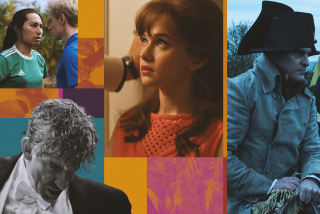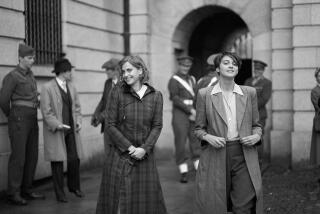Brutality, Compassion From D.W. Griffith
- Share via
ORANGE — Child abuse has often been a subject for modern filmmakers, but it was nearly taboo in the silent era.
D.W. Griffith, perhaps the greatest director of his day, was one of the few to put such violence on screen. In 1919, he released “Broken Blossoms,” about a girl, her brutal father and the compassionate Chinese man who loves her. It was much acclaimed.
The movie, which launches Chapman University’s free “Chapman Film Classics” series Tuesday night, is one of Griffith’s most persuasive movies. It’s not as sweeping or as visually ambitious as “Birth of a Nation” or “Intolerance,” but as effective in its sentimental, very human way.
The power of “Broken Blossoms” comes from the power with which Griffith portrays Lucy’s desperation. As the 12-year-old daughter of Battling Burrows (Donald Crisp), a near-psychotic London boxer, Lillian Gish uses the exaggerated acting that was the style of the time; but the almost surreal quality of her performance inspires vast sympathy.
When she pushes up the corners of her mouth to meet her father’s demand to smile, it’s not corny but wrenching. An even more disturbing moment comes near the picture’s end, when Lucy hides in a closet to escape Burrows. She’s literally an animal caught in a cage, running terrified in circles.
The filming of that scene, in fact, has become part of Hollywood lore. Gish’s acting supposedly was so animated and convincing during rehearsals that passersby stopped and implored Griffith to stop abusing his actress. Griffith, not one to miss an opportunity, instead egged her on, later telling Gish that he didn’t think she had that kind of fevered performance in her.
*
The role did much to make Gish’s career. The same can be said for those played by Crisp and, especially, Richard Barthelmess as Cheng Huan. Hollywood was without Chinese stars at the time so Barthelmess, done up in makeup and Asian costume, was tailored to portray the protagonist who befriends Lucy.
Griffith and Barthelmess’ take on Cheng Huan is clearly influenced by an Occidental’s superficial view of the Chinese--he even walks in a deferential bow--but there’s a nobility in the character that the others don’t have. Although everyone, including Burrows’ white friends, knows of Lucy’s plight, only Cheng Huan puts himself in danger to help her.
In retrospect, Griffith appears surprisingly forward-thinking in his decision to make Cheng Huan the hero. It’s also ironic given that “Birth of a Nation,” his masterpiece, is still condemned as racist for its glorification of the Ku Klux Klan.
In the mostly subtle scenes between Lucy and Cheng Huan, there’s romance, even a hint of sexuality, that could have angered less-liberated moviegoers of the day. Instead, the film was loved by just about everybody. That says something about Griffith’s deftness.
(BEGIN TEXT OF INFOBOX / INFOGRAPHIC)
Chapman Film Classics
Fall 1995 Series:
* Tuesday : “Broken Blossoms,” D.W. Griffith’s 1919 silent film starring Lillian Gish, Richard Barthelmess and Donald Crisp.
* Sept. 12: “The Immigrant,” Charlie Chaplin’s 1917 silent, and “The General,” Buster Keaton’s 1927 silent.
* Sept. 19: “Sunrise,” F.W. Murnau’s 1927 silent, starring Janet Gaynor and George O’Brien.
* Sept. 26: “It,” Clarence Badger’s 1927 silent starring Clara Bow, plus two “Betty Boop” cartoons.
* Oct. 3: “Blackmail,” Alfred Hitchcock’s 1929 film, plus two shorts by New Zealand director Len Lye, “A Colour Box” and “Trade Tattoo.”
* Oct. 10: Five avant-garde films, including Salvador Dali and Luis Bunuel’s “An Andulasian Dog.”
* Oct. 17: “Trouble in Paradise,” Ernst Lubitsch’s 1932 comedy starring Herbert Marshall and Miriam Hopkins.
* Oct. 24: “Potemkin,” Sergei Eisenstein’s 1925 silent, and “Chess Fever,” V.I. Pudovkin’s 1922 silent.
* Oct. 31: “Freaks,” Tod Browning’s 1932 movie, will screen with three cartoons from the ‘20s and ‘30s.
* Nov. 7: “Triumph of the Will,” Leni Riefenstahl’s 1935 Nazi propaganda film, and “The Nazis Strike,” Frank Capra and Anatole Litvak’s 1942 propaganda movie.
* Nov. 14: “Grand Illusion,” Jean Renoir’s 1937 film starring Jean Gabin.
* Nov. 21: “The Great Train Robbery,” Edwin S. Porter’s 1903 silent short, and “Stagecoach,” John Ford’s 1939 Western starring John Wayne.
* Nov. 28: “Citizen Kane,” Orson Welles’ 1941 film, and “Hearts of Age,” a short Welles made in 1934 at the age of 19.
* Dec. 5: “Double Indemnity,” Billy Wilder’s 1944 movie, starring Barbara Stanwyck and Fred MacMurray.
All films screen at 7 p.m. at Chapman University’s Argyros Forum, room 208, 333 N. Glassell Ave., Orange. Free. (714) 744-7018.
More to Read
Only good movies
Get the Indie Focus newsletter, Mark Olsen's weekly guide to the world of cinema.
You may occasionally receive promotional content from the Los Angeles Times.







